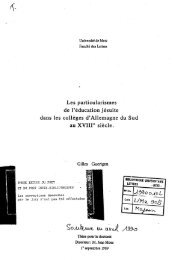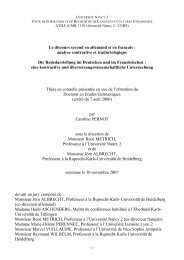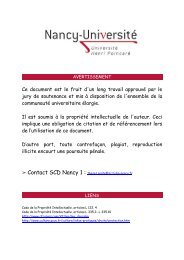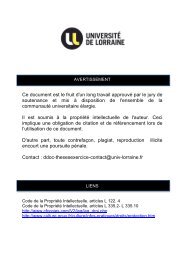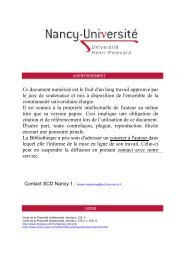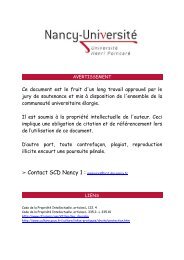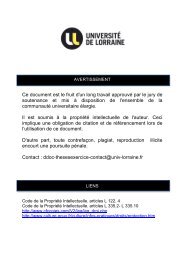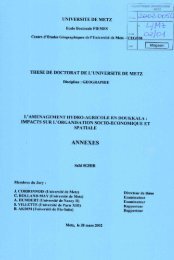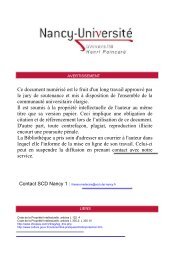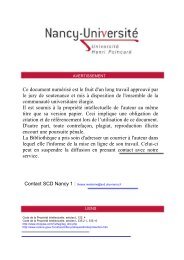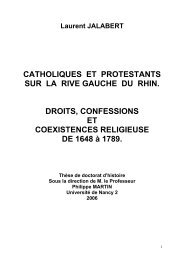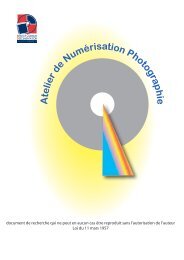- Page 1 and 2: Universität des Saarlandes Univers
- Page 3: Université de la Sarre Université
- Page 7 and 8: V Autour de l’œuvre 91 1 Une phi
- Page 9 and 10: Carte III : Vue d’ensemble du mon
- Page 11 and 12: Hefte qu’il dirigeait, et dans le
- Page 13 and 14: (elle écrivit des articles ainsi q
- Page 15 and 16: « d’illuminer, si peu soit-il, l
- Page 17 and 18: mais comme un acteur de ce monde et
- Page 19 and 20: notamment dans son contexte biograp
- Page 21 and 22: plan professionnel, Carl, remercié
- Page 23 and 24: écrivain professionnel. » 13 On a
- Page 25 and 26: Ferdinand Maximilien. 25 Le nom de
- Page 27 and 28: dettes, inflation. 33 Pour exemple,
- Page 29 and 30: ne permet aucune publication. » 42
- Page 31 and 32: Monsieur, J’ai reçu aujourd’hu
- Page 33 and 34: publication commune et je crains po
- Page 35 and 36: La maison de Leipzig, dirigée par
- Page 37 and 38: et connut quatre éditions (1946, 1
- Page 39 and 40: leurs droits. Overhoff dut, comme l
- Page 41 and 42: Cette deuxième édition, tirée à
- Page 43 and 44: accompagnée d’aucun activisme et
- Page 45 and 46: d’Overhoff paraît en effet assez
- Page 47 and 48: contemporains n’est pas une fin i
- Page 49 and 50: V.2 1950 La Trahison d’Afschin En
- Page 51 and 52: auteur les défauts du manuscrit, d
- Page 53 and 54: apprécié. 128 À ce refus, Overho
- Page 55 and 56:
conducteur à la progression du liv
- Page 57 and 58:
Les Overhoff effectuèrent deux voy
- Page 59 and 60:
comment lui, Européen de la second
- Page 61 and 62:
La Descente du Gange s’inscrit no
- Page 63 and 64:
l’idéologie du progrès, qui fai
- Page 65 and 66:
d’édition en 1967, refuse le man
- Page 67 and 68:
1973 à Overhoff de publier Une Fam
- Page 69 and 70:
CHAPITRE II Le Monde avec Gengis Kh
- Page 71 and 72:
situations « presque semblables »
- Page 73 and 74:
qu’Overhoff avait échoué dans c
- Page 75 and 76:
cette appréhension est elle-même
- Page 77 and 78:
Erde, d’Otto Gmelin. Cet auteur i
- Page 79 and 80:
seule période des années 30, on t
- Page 81 and 82:
contre l’idée du livre. 35 Overh
- Page 83 and 84:
genèse du Monde avec Gengis Khan.
- Page 85 and 86:
III.3.2 Les Ides de Mars de Thornto
- Page 87 and 88:
tableaux. La composition du livre,
- Page 89 and 90:
cités, des différentes provinces
- Page 91 and 92:
Dans son récit de voyage consacré
- Page 93 and 94:
chaque nation développe une « âm
- Page 95 and 96:
destiné à réaliser les prophéti
- Page 97 and 98:
toujours vue par un sujet, qui la v
- Page 99 and 100:
toutefois surévaluer les effets qu
- Page 101 and 102:
désir d’y retourner, de le retro
- Page 103 and 104:
Overhoff n’utilise pas le passé
- Page 105 and 106:
Die Geschichte seines Lebens nach d
- Page 107 and 108:
mais son origine n’est pas préci
- Page 109 and 110:
Sources critiques citées dans la b
- Page 111 and 112:
mythique du prêtre Jean. 140 Il es
- Page 113 and 114:
Monde avec Gengis Khan, contemporai
- Page 115 and 116:
frontières jusqu’en Corée, jusq
- Page 117 and 118:
occasion, en est la preuve. Le Mond
- Page 119 and 120:
virent les conquêtes des successeu
- Page 121 and 122:
générale de l’œuvre se termine
- Page 123 and 124:
Le choix de l’année 1225 pour cl
- Page 125 and 126:
le centre asiatique, Au centre, Au-
- Page 127 and 128:
d'âme et la mesquinerie ordinaire.
- Page 129 and 130:
En dehors du premier tableau, où l
- Page 131:
lui aussi la conception d’Overhof
- Page 136:
n’apparaît-il qu’au terme d’
- Page 139 and 140:
gothique. C’est ce que révélèr
- Page 141 and 142:
qu’Overhoff ne fait nulle part ai
- Page 143 and 144:
Le dialogue est utilisé huit fois
- Page 145 and 146:
VI.2.3.2.2.1 Le monologue de récit
- Page 147 and 148:
isquent sinon de lui demeurer d’u
- Page 149 and 150:
cet ouvrage, consacré à une descr
- Page 151 and 152:
parties consacrées aux terres d’
- Page 153 and 154:
Overhoff ne considère pas le gothi
- Page 155 and 156:
décrit les différentes constructi
- Page 157 and 158:
capital aux yeux d’Overhoff car i
- Page 159 and 160:
marial, la Vierge trouve une place
- Page 161 and 162:
secrète de l’Asie ? Les croisade
- Page 163 and 164:
2.1.1 Essor des villes Le XIII e si
- Page 165 and 166:
les croisades l’accentuation des
- Page 167 and 168:
qui avait pris le pouvoir en 1249.
- Page 169 and 170:
III.2 La Chine La moitié des deux
- Page 171 and 172:
empêchée que par la mort soudaine
- Page 173 and 174:
Il est à noter qu’Overhoff s’a
- Page 175:
Ces deux paragraphes qui terminent
- Page 178 and 179:
proches de l’avancée mongole, se
- Page 180 and 181:
à plusieurs niveaux : celui des pe
- Page 182 and 183:
printemps 1221. 5 Cette lettre cont
- Page 184 and 185:
Le pape a manifestement ordonné qu
- Page 186 and 187:
Monologue (de récit) d’un moine
- Page 188 and 189:
Perception des Mongols Dans ce dern
- Page 190 and 191:
chancelier de France sous Louis VII
- Page 192 and 193:
pape est contestée, et l’instabi
- Page 194 and 195:
Nous préparons nos sabres et lance
- Page 196 and 197:
fut-il un traître à son maître,
- Page 198 and 199:
sujet comme on l’apprend au table
- Page 200 and 201:
époque pleine de contradictions, d
- Page 202 and 203:
Musulmans de se défendre et d’of
- Page 204 and 205:
Perception des Mongols Théodore An
- Page 206 and 207:
Ce tableau se déroule donc avant l
- Page 208 and 209:
conservées à Cologne et les ramen
- Page 210 and 211:
a une vison sur la durée. Il est p
- Page 212 and 213:
cavalier mongol au tableau 15, dont
- Page 214 and 215:
prendre en compte dans leur percept
- Page 216 and 217:
Éléments de datation La mort du c
- Page 218 and 219:
cours du roman, la parole est donn
- Page 220 and 221:
description du Mongol et de son com
- Page 222 and 223:
tableau 19, puis Djalal ed-Din Rûm
- Page 224 and 225:
questions, des remarques, des injon
- Page 226 and 227:
de l’ouvrage de Friedrich et Budd
- Page 228 and 229:
Rawandi, dit l’hérétique, 175 a
- Page 230 and 231:
écemment : Muhammad de Ghur sultan
- Page 232 and 233:
1246. 187 Overhoff substitue donc u
- Page 234 and 235:
nostalgie de la beauté, de la rév
- Page 236 and 237:
Chapitre IV Au centre 25 Lettre Exe
- Page 238 and 239:
propre plume, et non plus une citat
- Page 240 and 241:
Alors qu’on voit l’opportunisme
- Page 242 and 243:
28 Sans localisation Sous-titre : D
- Page 244 and 245:
Cette réflexion sur la raison d’
- Page 246 and 247:
À Gengis Khan revient le mérite d
- Page 248 and 249:
appeler que tous les dieux émanent
- Page 250 and 251:
Afin de montrer toutes les réalit
- Page 252 and 253:
l’utilisation politique telle qu
- Page 254 and 255:
Rûmî appliquent chacun qui une st
- Page 256 and 257:
d’Overhoff dans les propos de ses
- Page 258 and 259:
Cette dimension spirituelle du cara
- Page 260 and 261:
convaincre l’empereur des Francs
- Page 262 and 263:
paroles suivantes, le jour de la si
- Page 264 and 265:
avec la science de l’historien du
- Page 266 and 267:
l’empire de Gengis Khan à la Chi
- Page 268 and 269:
avaient, dans leur immense majorit
- Page 270 and 271:
ANNEXES
- Page 272 and 273:
Documents joints au roman par Juliu
- Page 277 and 278:
280
- Page 279:
282
- Page 282 and 283:
Lettre de Frédéric II du 3 juille
- Page 287 and 288:
Traduction de la lettre de Frédér
- Page 289 and 290:
unbeschützten und schwachen Seiten
- Page 291 and 292:
a] Sanctissimo patri ac domino H(on
- Page 293 and 294:
malefactores punire iuramento teneb
- Page 295 and 296:
obediunt: rogo ut per litteras et n
- Page 297 and 298:
Andream de Espoisse et quosdam de f
- Page 299 and 300:
peine trouvé quatre ou cinq qui fu
- Page 301 and 302:
le métier des armes, d’esprit ha
- Page 303 and 304:
hit le territoire de Chavarsmisan.
- Page 305 and 306:
des Sarrasins, sans que nul pût lu
- Page 307 and 308:
310
- Page 310 and 311:
Traduction de la lettre de Roussoud
- Page 312 and 313:
Comptes rendus sur Le Monde avec Ge
- Page 314 and 315:
Kölner Rundschau, 25.10.1959 Mongo
- Page 316 and 317:
Allgemeine Sonntagszeitung, 29.11.1
- Page 318 and 319:
Reaktion auf verschiedene Persönli
- Page 320 and 321:
Niedertracht, die sich heute noch a
- Page 322 and 323:
verlangt historische Vorbildung und
- Page 324 and 325:
nüchterner Bericht manche Leser wa
- Page 326 and 327:
das Abendland nicht alles ist in de
- Page 328:
Buch Overhoffs zeichnet sich durch
- Page 331 and 332:
Echo der Zeit, 04.09.1960 Die Gleic
- Page 333 and 334:
„Weltgeschichte in Umrissen“, m
- Page 335 and 336:
338
- Page 337:
340 Lettre de Peter Suhrkamp à Jul
- Page 345:
348 Document interne des éditions
- Page 355:
358 Premier contrat d’édition si
- Page 360 and 361:
Documents concernant le retour de J
- Page 363:
366 Lettre de Peter Suhrkamp à Jak
- Page 370 and 371:
Rétrospectives de Julius Overhoff
- Page 372 and 373:
wohl dem, der durch die Wand zu tre
- Page 374 and 375:
gemacht hat, weiß es am besten, di
- Page 376 and 377:
BIBLIOGRAPHIE DE JULIUS OVERHOFF Mo
- Page 378 and 379:
Zu Protokoll. Ein Lesespiel, in : J
- Page 380 and 381:
BIBLIOGRAPHIE CRITIQUE SUR OVERHOFF
- Page 382 and 383:
BIBLIOGRAPHIE DES COMPTES RENDUS DE
- Page 384 and 385:
Une Famille de Mégare 1961 04.11.1
- Page 386 and 387:
13.07.1949, Schwäbische Post 13.07
- Page 388 and 389:
12.12.1959, Neue Zürcher Nachricht
- Page 390 and 391:
Büchereiwesen in Holstein, Bücher
- Page 392 and 393:
2 e trimestre 1964, Die Bücherkomm
- Page 394 and 395:
BIBLIOGRAPHIE GÉNÉRALE Sur l’hi
- Page 396 and 397:
Hazlitt, William Carew : The Veneti
- Page 398 and 399:
Roman historique Aust, Hugo : Der h
- Page 400:
Stach, Reiner : 100 Jahre S. Fische



